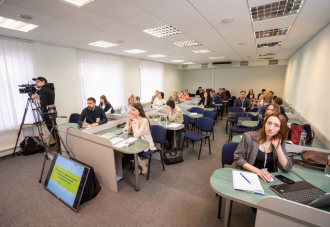Experts see four stages on the route of mentor-mentee cooperation: assessment of realities and potential, goal and path alignment, development of abilities and potential, and pauses for monitoring and adjustments.
We continue to collect practical cases and recommendations from mentors in the Mentorship Program 3.0 to show how the mentees can be supported on the way to their goal given the crisis conditions that the war creates.
In previous materials, mentors talked about their own experience at the stages of assessing the mentee’s current situation and potential, and also shared stories about goal alignment and building a cooperation map.
In today’s article, Mariia Zviahintseva (NGO The Legal Hundred) and Denys Davydenko (RPR Coalition) will talk about how they support the development of mentee’s abilities and potential.
What are the biggest challenges in supporting a mentee in the times of war?
A shift in priorities.
Mariia Zviahintseva tells us: “With the beginning of the full-scale invasion, with the influx of a significant number of IDPs into the region, the goals and even the purpose of the project changed a little. The project is more inclusive of vulnerable categories and their list has expanded in the region, so this has had an impact on the advocacy plan development.”
Significant changes in the stakeholder map.
According to Mariia Zviahintseva, the people who were relied on during the application for participation in the Mentorship Program and during the identification of the project’s goal, either moved away from this problem, or changed their priorities, or were mobilized.
These changes, according to the mentor, influenced not so much the mentee cooperation itself, but the development of the advocacy plan and the further project in terms of changing needs and target audience.
“We don’t give up on an idea”.
Denys Davydenko says that the war affected the work of his mentee community (namely, the Association of Public Advisors of Ukraine), but it did not affect communication and cooperation within the Mentorship Program: “In addition, mentees became members of the RPR union, so we will continue to communicate, already inseparable in this activity.”
When Mr. Denys and his mentee started working together, they decided that the main focus would be the advocacy of the legislative definition of the term ‘public advisor’. And this was the source of certain challenges.
The first such challenge according to Denys Davydenko is the poor perception of public advisors from the point of view of the authorities. Therefore, in his opinion, a lot of preliminary work needs to be done, in particular, additional communication with other communities engaged in related activities and with MPs is needed.
“For example, these are communities of public advisors in the field of inclusion or communities of public advisors in the field of HIV/AIDS, and they might also be interested in having a legislative definition, having a relevant state policy that would improve the field of activity of public advisors in Ukraine,” adds the mentor.
A further challenge is the lack of consensus that a legislative definition is needed within the community of public advisors themselves: “We have had meetings with the community, we have heard very different opinions and very different risks, and this is very similar to the parallel process of advocating for a draft law on social entrepreneurship”.
That is why Denys Davydenko and his mentees, in addition to advocating for the draft law and the idea of a legislative definition, added another focus – separate areas where the RPR Coalition and the Association of Public Advisors of Ukraine can cooperate: “This is decentralization reform, public consultations, reintegration, protection of human rights, recovery of the country from the consequences of war, implementation of the draft law on administrative procedure at the level of local self-government.”
According to the mentor, the very platform of the Association of Public Advisors could be helpful in converting the solution to the problems that they themselves identify.
Which mentors’ skills and abilities help to be in contact and accompany mentees in the conditions of change?
Mentors point out that it is important to have an informed prior experience in order to be able to pass it on.
According to Mariia Zviahintseva, previous experience of participating in advocacy campaigns and skills in working with documents help significantly. Mediation skills remain relevant, as was the case in the previous stages.
“This, of course, primarily concerned rule-making, advocating for legislative changes. For me, experience in promoting local initiatives is quite new, nevertheless, to a certain extent it is consensual,” adds the mentor.
Denys Davydenko says that the previous experience of advocacy and communication with regional RPR coalitions is useful: “A concrete example: we have regional communities, regional coalitions, they, like the community of public advisors in different regions, have different contexts, have different expertise. And the challenge of working with them is trying to properly structure the interaction, taking into account their different expertise, and assessing value and importance. The community of public advisers is similar in this. I often see similarities with communication with our regional coalitions, in terms of advocacy.”
What is the most valuable experience gained by mentors during cooperation with the mentee?
For Denys Davydenko, the experience of mentoring, expanding RPR and responding to a challenge became valuable.
“The process of building communication in the focus of mentoring is the most valuable experience for me,” says Denys Davydenko. “In general, the very fact of our interaction. I believe that we managed to build good communication during this time, we basically understand each other well.”
The mentor plans to continue cooperation with the mentee organization even after the end of the Program: “Our joint work will result in a certain document. But I am convinced that this document will be modified. Because we will engage in cooperation with public advisers on each of these topics, and there we will have new challenges and new opportunities.”
For Mariia Zviahintseva, in addition to the mentoring experience as such, the peer-to-peer interaction format became valuable: “When your mentors have more extensive expertise on the subject, and you can give some advice or give your opinion after taking a fresh look at it, but by no means should you lecture them or say something like ‘I know better, and now I will tell you what to do’.”
Denys Davydenko also adds: “The biggest challenge for a mentor is to understand how to structure their expertise and show them how to work with it better, because they are the holders of this expertise, they have a better understanding of both their own problems and the problems of their communities.”
Which mentor tools are helpful at the support stage?
Tool 1. Expanding perspective.
Mariia Zviahintseva agrees that it is important to move away from the wall, to look at the problem in different way, through a different lens. Mentors learned this, in particular, during sessions with Viktoriia Mryshuk.
Tool 2. Stakeholder map.
“Any advocacy campaign should be based on a proper analysis and understanding of stakeholders,” adds Denys Davydenko. “As my former manager used to say: ‘Stakeholders are our everything in advocacy.’ That’s why the documents we’re going to prepare will have more than one map”.
Mentors also cited a few tips for colleagues just starting to use mentoring tools:
- Help the mentee immerse themselves in the topic, because it can help find outside expertise;
- Do not rush into the topic right away, but first take some extra time to understand it in more detail;
- Do not dive into the project globally, trying to do everything at once, instead move gradually, step by step.
Prepared by Kseniia Ditchuk
Mentorship Program 3.0 to strengthen the advocacy and other capacities of civil society organizations from different parts of Ukraine is part of the Project Ukraine Civil Society Sectoral Support Activity implemented by the Initiative Center to Support Social Action “Ednannia” in partnership with the Ukrainian Center for Independent Political Research (UCIPR) and Centre for Democracy and Rule of Law (CEDEM) with the sincere support of the American people through United States Agency for International Development.



